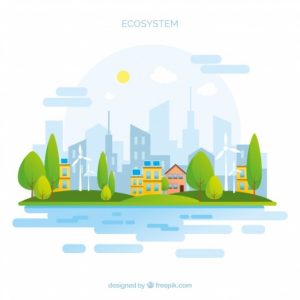Recognising the need to change our worldview (belief systems) from human-centrism to eco-centrism – and re-building of trust in our institutions, in this chapter, the Author argues for the re-conceptualization of the university / higher education purpose and scope focusing on achieving the UN-2030 Transformative Vision – “ending poverty, hunger, inequality and protecting the Earth’s natural resources.”
Announcing a Forthcoming Chapter
The University in the early Decades of the Third Millennium
Saving the World from itself?
By George Lueddeke, PhD, MEd, Dipl. AVES (Hon.)
Chapter Overview
Environmental degradation, economic and political threats along with ideological extremism necessitate a global redirection towards well-being and sustainability. Since the survival of all species (humans, animals, plants) is wholly dependent on a healthy planet, urgent action at the highest levels to address large-scale interconnected problems is needed to counter the thinking that perpetuates the “folly of a limitless world.”1
Paralleling critical societal roles played by universities – ancient, medieval and modern – throughout the millennia, and prompted by my current book, Survival: One Health, One Planet, One Future , 1 and contributing chapter to a forthcoming publication,2 I call for all universities and higher education institutions generally – estimated at over 28,000 with close to 300 million students – to take a lead together with the United Nations Youth Forum and other major partners – to tackle the pressing complex and intractable challenges that face us.
Recognising the need to change our worldview (belief systems) from human-centrism to eco-centrism – and re-building of trust in our institutions, in this chapter, 2,1 I argue for the re-conceptualization of the university / higher education purpose and scope focusing on achieving the UN-2030 Transformative Vision – “ending poverty, hunger, inequality and protecting the Earth’s natural resources.” 4
Time is not on our side. While much of the groundwork has been done by the UN and civil society, concerns remain over the variable support given to the UN-2030 Sustainable Development Goals (SDGs), especially in light of the negative impact of global biodiversity loss3 on achieving the UN-2030 Sustainable Development Goals (SDGs).4
Ten Propositions for Global Sustainability,1 ranging from adopting the SDGs4 at national and local levels to ensuring peaceful uses of technology and UN reforms in line with global socioeconomic shifts, are highlighted.1 As one example, Proposition #7 calls for the unifying One Health and Well-Being (OHWB) concept to become the cornerstone of our educational systems as well as societal institutions and to underpin the UN-2030 SDGs.
A step in this direction is the evolving international One Health for One Planet Education initiative (1 HOPE), led by the One Health Commission and the One Health Initiative.5 With working groups from education and societal sectors presently being established across six global regions, its main aim is to ‘Build global capacity for promoting and valuing the OHWB concept and approach as the foundation for achieving the UN-2030 Sustainable Development Goals (SDGs).’
In a post-chapter reflection the evidence that our planet’s biosphere continues to be at risk (e.g., Australian bushfires) is increasing. As a consequence, it appears that some who see their role as having to satisfy different interest groups (e.g., electorate, shareholders) are having second thoughts. The efforts of Sir David Attenborough,6, Greta Thunberg,7 Xiuhtezcatl Martinez,8 and pro-environment Youth campaigners around the globe are having at least some impact on reversing irresponsible decisions. A few government and corporate leaders are even re-setting their priorities – not because of external pressures but because they personally realise what is at stake for their families and future generations.
Indeed, global support for those who continue to ‘subscribe to the follies that Earth resources are limitless, that climate change is a hoax, that autocracy is preferable to democracy, that compassion is a sign of weakness, that profit comes before principle, that division is preferable to unity,’ 2 is gradually weakening at least in a few corners of the world.
Martin Wolfe, chief economics commentator at the Financial Times, London, concludes that tackling climate change ‘policy has to be global, with all the bigger economies involved’ and with solutions ‘found in generous assistance from high-income countries to emerging and developing countries.’ 9 He doubts the probability of success ‘in an era of populism and nationalism’ cautioning his readers, ‘But the young are surely right to expect better.’
It is noteworthy that for the first time since 2006 the World Economic Forum ‘Global Risks Report 2020 is dominated by the environment’.10 In the light of projected global impacts (e.g., extreme weather, biodiversity loss), it seems unimaginable and totally unacceptable “that in the face of this development, when the challenges before us demand immediate collective action, fractures within the global community appear to only be widening.”
References
1Lueddeke, G. (2019). Survival: One Health, One Planet, One Future. London: Routledge.
2Lueddeke, G.R. (2020, summer). The University in the early Decades of the Third Millennium (Saving the World from itself?). In E. Sengupta, P. Blessinger, & C. Mahoney (Eds.), Civil society and social responsibility in higher education (vol.21, Innovations in Higher Education Teaching and Learning).
3IPBES (2019, May 6). Global assessment report on biodiversity and ecosystem services. Retrieved from https://ipbes.net/global-assessment-report-biodiversity-ecosystem-services
4 United Nations. (2015). Transforming our world: The 2030 agenda for sustainable development. Division for Sustainable Development Goals. (Department of Economic and Social Affairs). Retrieved from https://sustainabledevelopment.un.org/post2015/transformingourworld
5One Health Commission & One Health Initiative. (2020, December 12). The One Health education task force: Preparing society for the world we need. Retrieved from https://www.onehealthcommission.org/en/programs/one_health_education_task_force/
6Davies, H.J. (2020, January 15 ). David Attenborough warns that humans have ‘overrun the world.’ The Guardian. Retrieved from https://www.theguardian.com/tv-and-radio/2020/jan/15/david-attenborough-warns-that-humans-have-overrun-the-world
7Berghof, E. (2019, August 23). Economics can no longer ignore the earth’s natural boundaries. World Economic Forum. Retrieved from https://www.weforum.org/agenda/2019/08/building-a-truly-sustainable-global-economy-heres-how/
8Tang, M.C. (2019, August 28). Xiuhtezcatl Martinez: “This crisis is one of the most unifying moments of human history.” Landscape News. Retrieved from https://news.globallandscapesforum.org/38449/xiuhtezcatl-martinez-this-crisis-is-one-of-the-most-unifying-moments-of-human-history/
9Wolf, M. (2019, |November 5). There is one way forward on climate change. Financial Times. Retrieved from https://www.ft.com/content/27c9a6e8-ffb7-11e9-b7bc-f3fa4e77dd47
10World Economic Forum. (2020, January 17). Retrieved from https://www.weforum.org/agenda/2020/01/global-risks-climate-change-cyberattacks-economic-political/?utm_source=sfmc&utm_medium=email&utm_campaign=2710051_Agenda_weekly-17January2020-20200115_083452&utm_term=&emailType=Newsletter
ADDENDUM
On the same topic recently on PEAH
INTERVIEW – ‘Survival: One Health, One Planet, One Future’ – Routledge, 1st edition, 2019
Also of interest
USA Senate (bi-partisan) declares January 2020 National One Health Awareness Month!
https://www.onehealthcommission.org/index.cfm/38050/47205/one_health_awareness_month_campaign)
WEBINAR INVITATIONS
(1) January 30, 2020: 9:30 AM – 10:30 AM Eastern Standard Time (EST)
*ONE HEALTH AND WELL-BEING: TOWARD HUMAN-NATURE SUSTAINABILITY*
Hosted by the CORE Group. Presentation by Dr. George Lueddeke
(2) 9 February, 2020: 1PM-2:30 PM EST
*ONE HEALTH ADVOCACY: EDUCATION AND POLICY IN ACTION*
Hosted by the International Student One Health Alliance (ISOHA)
Presentations by Dr Deborah Thomson and Dr George Lueddeke
https://attendee.gotowebinar.com/register/6070814218892000269

